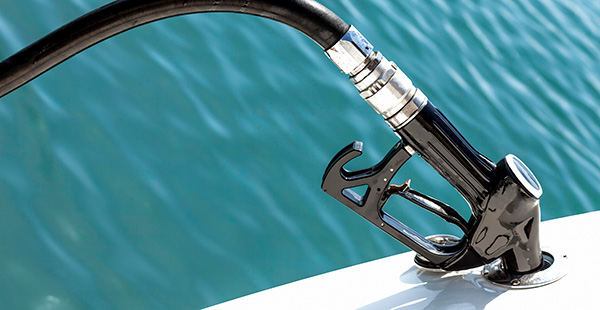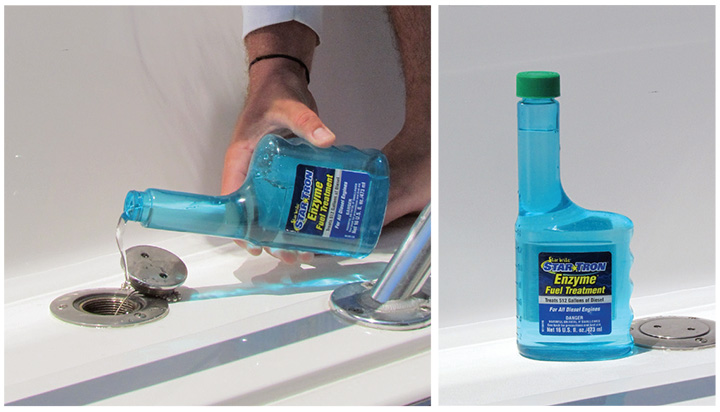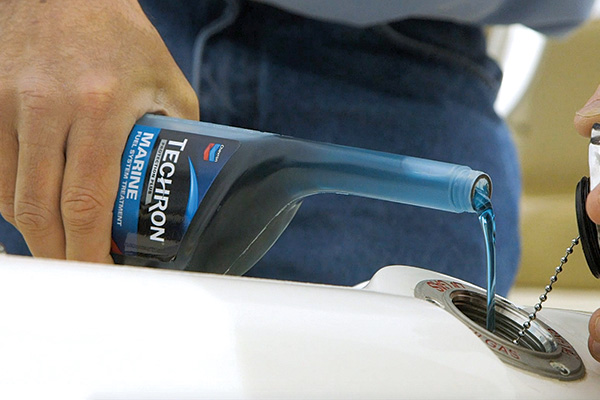Fuels & Additives: fighting for a healthy, running boat

By Adam Quandt
When it comes to fuels, at this point it’s clear that 15% ethanol (E15) is not going away. In fact, the Environmental Protection Agency and the Trump Administration have both pledged a commitment to the year-round sale of E15. With that, the marine industry continues to stress education as a form of defense toward misfuelling risks.
“We are not fighting against year-round E15 sales just for fun – we oppose EPA’s reckless proposal because it will increase the availability of a fuel that destroys marine engines and jeopardizes the safety of boaters,” said National Marine Manufacturer Association (NMMA) senior vice president of government and legal affairs Nicole Vasilaros. “With more than three in five Americans mistakenly assuming that any gas sold at gas stations is safe for all of their products, it is clear that the federal government has shirked its responsibility to effectively protect consumers from a fuel deemed so dangerous that its federally prohibited from being used in countless consumer products. And the last thing the government should do is pump more E15 into the fuel supply. Instead of jamming through a policy that almost nobody likes, EPA should focus on preventing consumers from misfuelling – including better labeling and stronger safeguards at the pump.”
While safe in many newer-model-year vehicles, E15 presents a particular risk to marine engines due to the increased risk of the fuels separation when in the presence of condensation and water. In addition, the increase in ethanol presents more opportunity to harmfully react with fuel tanks, fuel filters and carburetors.
“Our biggest concern with ethanol is the long-term issues associated with wear on fuel system components,” ValvTect Petroleum Products vice president Dave Grochocki said in a past interview with Boating Industry. “I think that’s going to be the next wave of problems. You will have fuel systems breaking down that have run fine for years.”
The concern continues to be at the forefront of any fuel discussion in today’s recreational marine industry.
According to a study conducted by the Outdoor Power Equipment Institute, 63% of consumers assume any gas sold at a retail gas station must be safe for their product and only 7% of consumers know that E15 is prohibited in all engines except late-model automobiles.

With education and clear labeling at the forefront of NMMA’s efforts, Congresswomen Lois Frankel (D-FL-21) and Congressman Austin Scott (R-GA-08), members of the Congressional Boating Caucus, reintroduced bipartisan legislation to more clearly define and label E15 at gas station pumps in early 2019.
“With the EPA working to authorize year-round sales of E15 ahead of the 2019 summer season, the Consumer Protection and Fuel Transparency Act is needed now more than ever,” NMMA president Thom Dammrich said in a press release. “Representative Frankel and Representative Scott have been tireless advocates in the effort to protect countless American consumers and 141 million recreational boaters from the dangers of misfuelling, and we thank them for reintroducing this commonsense legislation. NMMA looks forward to working with both leaders to get this bill across the finish line and encourages all Members of Congress to support this critical measure.”
“As the industry experienced with E10 fuel, there’s a learning curve that the industry had to go through,” said Joe DeFina global brand manager, fuel additives at Chevron Lubricants. “There’s definitely still that curve with E15 and unfortunately, some people are getting an expensive lesson.”
Along with educational and clear labeling efforts for E15, NMMA has been working hard to promote an E15 alternative, bio-isobutanol as a fuel additive. The fuel additive alternative is a four-carbon alcohol produced from renewable, plant-derived energy sources in a fermentation process similar to beer and wine production. However, unlike E15, the bio-isobutanol keeps fuel compatible with current vehicles, boats and infrastructure.

Last summer, NMMA applauded the industry’s efforts for the alternative, which was approved the registration of bio-isobutanol as a fuel additive by EPA administrator Scott Pruitt.
“This decision will promote an innovative fuel supply, with direct benefits to American boaters and consumers,” Dammrich said at the time of the approval.
As the battle over ethanol and fuel continues, one thing remains a constant reminder from NMMA and other industry associations, as well as dealers and everyone in between: consumers need to be aware of what can and cannot go into their boats.
Healthy engine, healthy boater
It’s no great secret that the marine environment is one that is harsh. From freshwater to saltwater, marine engines face a plethora of issues from corrosion to fuel stability and everything in between. Unlike automobiles, which receive near-everyday use, not to mention a more-forgiving environment, marine engines require a little help to maintain optimum performance. That’s where fuel additives come in and the market is full of options.
With that and the issues surrounding E15 fuel, many consumers wonder if a fuel additive will make E15 safe to run in small engines, like those found in the recreational boating industry. Plain and simple, the answer is no.
“E15 in the news is certainly driving awareness back to fuel additives,” Star brite executive vice president Greg Dornau said. “While most fuel additives will work fine in E15 gas, it is imperative that we educate the public that no fuel additive can make E15 run in an engine not designed for E15 fuel. Education at the pump and in marine news outlets is critical to prevent misfuelling.”
However, fuel additives can help marine engines survive and thrive in the harsh environments they find themselves in.
“I see them [fuel additives] as a complete necessity when you own a boat,” said Joe DeFina, global brand manager, fuel additives at Chevron. “As a boat owner, I believe you have two main concerns: the safety of your passengers and the overall health of your boat systems. Both of which go hand-in-hand.”
Relatively new to the market, Chevron’s Techron product is specifically designed for the marine engine and environment. DeFina said that at a very high level, Techron offers a comprehensive marine additive for fuel stability, freshwater and saltwater corrosion protection and cleaning, all in one product.
“We looked at what the industry needs were, deconstructed the marketplace and identified the gaps before we reached Techron,” DeFina said. “There were plenty of recommended products from multiple brands, but we constantly saw ‘use this one brand’s product along with another from a different brand.’ We set out to create a product to work across the board.”
Star brite has moved a large portion of its current focus in the marine additive world to zero in on diesel fuel and how to improve performance in diesel engines, Dornau said.
While fuel additives are great to use when small issues may seem to be popping up, all of the leading fuel additive manufacturers suggest regularly using additives as a preventative measure.
“Using the right product and right behaviors from the get go minimizes fuel system issues, rather than hoping for that ‘magic bullet’ fix,” DeFina said.
Something as simple as maintaining the right habits when it comes to a boat’s fuel system can be the difference between a healthy and happy boater who spends more time out on the water, and those leaving the activity when their boat spends more time in the repair shop than on the water.




